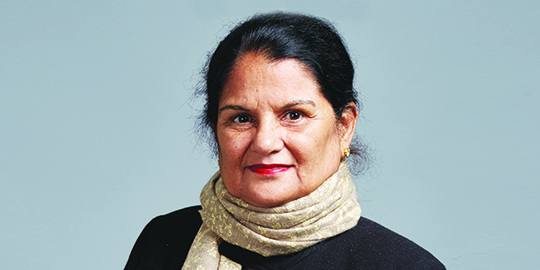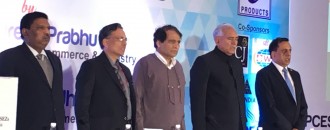
Weaving her way to Stardom
She refused to disappear into obscurity after her early marriage and kids, and chose a road less-travelled only to carve a niche in the global shawl market. Her company Shingora today exports 90% of what it manufactures, and is a globally recognised name in the industry. Meet Mridula Jain, who with her single-minded devotion has weaved a success story for herself and her company.
Shivani Kapoor | March 2016 Issue | The Dollar Business
As someone who has always been a fashionable girl throughout her childhood, and one who loves wearing experimental clothing, becoming one of the biggest manufacturers and exporters of designer shawls in the country was a natural progression. And Mridula Jain is one such living example whose inner urge of entrepreneurship changed the perception of Indian shawls on the global platform.
When Mridula envisioned her dream to foray into the shawl business in 1986, it seemed improbable to many. But what started with just eight handlooms and a handful of shawl weavers, Shingora Shawls is today one of the biggest exporters of designer shawls with 90% of its products selling in overseas markets (it has already made a mark in Germany, Holland, Switzerland and Japan as brand 'Shingora'), and the rest 10% being confined to domestic sales. “I always had this craving to do something, and I knew I would make it. I always used to dream of it and I still do, even after so many years in the business,” she speaks regarding the clarity of her mind.
And Mridula is happily content with this rare feat she has achieved over these years while keeping her feet firmly planted on the ground. “We always have to be level-headed and never ever think we are great. I believe that god has made me do it and he has been kind enough to be supportive of me throughout, whatever I wanted to do, he has been guiding me through it,” she says with a smile.
It wasn’t an even path for a late beginner like Jain, who plunged into the business after 17 years of marriage. And she credits her husband, who was already into the knitwear business, to help her make a mark. A preeminent shawl professional, she has been showered with many awards for her export performance and entrepreneurial skills. Known for her forthrightness, she believes in treating her employees and customers well. A blend of family-oriented and yet free living, she likes spending time with the family, watching the latest Bollywood movies and savoring Punjabi cuisine. Ask her if she wants to walk another path and she replies,“Well, weaving is in our blood now. If at all we decide to diversify, it would be along the same lines.”
TDB: You brought about a trend by introducing designer shawls through your creations. In fact, Shingora is a well known name in shawls category now. Tell us about your entrepreneurial journey.
Mridula Jain (MJ): Born into a family of professionals, I never wanted to sit back at home doing nothing. While my sons attended school, I used to take home tuitions. But I still had the urge to step out of the house and do something for myself. I shared this desire with my husband, who was already involved in the knitwear business. I thought shawls would be a good business, so, in 1986, with the help of a few handlooms and a handful weavers, I plunged into it. We named the business Shingora (derived from Hindi word 'Sringar' meaning ornament) because I wanted my shawls to be used as an ornamentation of a woman. This is how it all began.
But I made sure my shawls had a dash of creativity so I experimented with the designs adding phulkari work, mirror work, hand painting, unlike the traditional pashmina shawls. I introduced weaving patterns into traditional Kullu shawls. These were the designer shawls, different from the typical Kashmiri shawls. Gradually, people started appreciating my work and we started getting more orders and our operations expanded.
TDB: How has been your overseas experience? What percentage of your sales comes from exports?
MJ: Three years after the inception of Shingora, I forayed into exports. And it was nothing more than a coincidence. During one of the award functions with my husband, I happened to meet the chairperson of the Wool & Woollen Export Promotion Council. During our interaction, she asked me to start exports of shawls. She was the one who sponsored me to visit Western Europe to study its markets for shawls and that was the beginning of my exports of Indian shawls to Europe. Currently, we are exporting 90% of our shawls and only 10% is for domestic sales.
There was a time when people outside India didn’t know that Indian shawls could be worn fashionably. Keeping that outlook in mind, we worked with The Woolmark Company to produce shawls in smaller sizes (stoles) which could go well with western outfits and jackets. As our exports began, it became a fashion statement to wear a shawl across the globe. We have been exporting to US, Western Europe, Japan, Australia, etc.
TDB: Are there any lessons you would want to share with budding exporters in the textile industry?
MJ: I would say, it’s always good to meet your buyers first. When you meet new people, you learn many things from them. That is where you get new ideas, and then you can improvise on your products. Your vision towards life also changes. I always advise my people to travel a lot and meet as many people as they possibly can.
TDB: Since you are majorly into exports, are there any challenges or hurdles that come your way? If yes, what are they?
MJ: Yes, of course! There are hurdles, and time and again we have discussed them with the Ministry of Commerce as well as the Textile Ministry. A major challenge is the lack of clarity over the definition of shawls. Whether we make stoles, scarves or shawls, all of them are exported under one HS code. And this practice has been going on for years. There is no specification about the product. In that sense, we face a lot of problems with the Customs department, as the officials can’t differentiate between a muffler or a scarf or even a shawl and they hold the shipments.
Then, of course, competition has increased globally. China has entered our export markets. The entry of cheaper Chinese items of inferior quality has made a dent in our business. We are not at the comfortable stage as we were earlier. Although our market size is growing, our margins have shrunk.
TDB: And what about competition from other brands in the domestic market?
MJ: The Indian brands in shawls category are very conservative. I mean, they just follow the traditional patterns in weaving their shawls. Ever since the beginning of Shingora, we have had our thrust on creativity, be it colours or designs. This way, we have always had an upper hand in the market. Even today, if a dealer wants to have a variety of shawls, he likes to keep a few pieces from Shingora to attract people. Ours is a high fashion brand.
TDB: After over three decades into shawl exports, you are an inspiration for many budding woman entrepreneurs. Do you have a message for them?
MJ: If you really want to do something, you should have confidence in yourself. Of course, you won’t succeed in the first attempt and it might take time. Just do it with your heart and soul and visualise what you want to achieve. Never stop dreaming and things will fall into place.
TDB: You are a mother, a wife, a mother-in-law, besides being the Vice-Chairman of Shingora. How do you live up to all the roles so perfectly?
MJ: There will be many things in your life. You should set your priorities right. If you have kids, then even if you are working, you should take time out for them. You need to divide your time such that you are also available to your family. For that, one must have time management skills. As women, our jobs are very tough, we have to keep our head on our shoulders and not waver.







 to success.
to success.